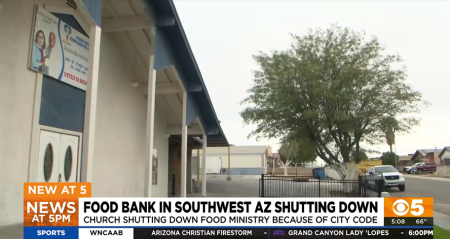Judge denies city’s motion to dismiss church’s lawsuit for shutting down food ministry

A judge has ruled that an Arizona city cannot stop a church from suing them for shutting down a ministry that provided food to hundreds of needy families near the U.S. southern border.
Senior United States District Judge G. Murray Snow, a George W. Bush appointee, issued an order last Friday denying the city of San Luis’ request to dismiss a lawsuit filed by Gethsemani Baptist Church.
According to Snow's ruling, “the Church has a plausible claim that it maintains the legal right to continue operating its ministry” and that the congregation “sufficiently plead facts to establish a plausible entitlement to relief.”
Gethsemani Baptist Church is being represented by the First Liberty Institute (FLI), a law firm that has won First Amendment cases before the U.S. Supreme Court.
“The city should vigorously support a church that meets the needs of those going hungry without using government resources,” said Camille Varone, associate counsel with FLI, in a statement released Monday.
“It’s indefensible that a city would purposefully stop a ministry that feeds the hungry. We hope to allow Gethsemani Baptist Church to once again provide care for the vulnerable, hurting people in the surrounding communities.”
In March, Gethsemani filed a complaint in federal court against the city of San Luis, Mayor Nieves G. Riedel, Acting City Manager Jenny Torres and City Code Enforcement Officer Alexis Gomez Cordova.
According to the suit, the city shut down the food ministry, which had operated since 1999 and has reportedly helped hundreds of families by distributing food and sharing the Gospel.
After Riedel's election in 2022, according to the complaint, the city argued that the outreach program violated zoning laws, such as having semi-trucks in a residential area. City officials deemed the church to be engaging in "commercial-level food distribution."
"Since 2012, when the City adopted its current Zoning Code, the Church and its Food Ministry were treated as a 'legal nonconforming use,' meaning that it could continue to operate in the residential zone," the complaint read.
"While the Food Ministry has certainly grown in scale in the years since its founding, requiring larger trucks as early as 2002 to effectively transport food and supplies, it has not dramatically changed in scope or character since the Zoning Code was adopted."
In late July, the U.S. Department of Justice filed a statement of interest in the U.S. District Court for the District of Arizona, explaining that the church’s activities were legitimate under the Religious Land Use and Institutionalized Persons Act of 2000.
“Federal law provides broad protection to religious exercise, including for ministries that serve people who are hungry or in need of basic supplies,” said Assistant Attorney General Kristen Clarke of the DOJ Civil Rights Division in a statement.
“Once a municipality applies its zoning code to restrict religious exercise, impacted groups do not need to jump through procedural hoops to obtain relief in federal court. The Justice Department is committed to ensuring that religious groups can properly exercise their rights under RLUIPA.”





















